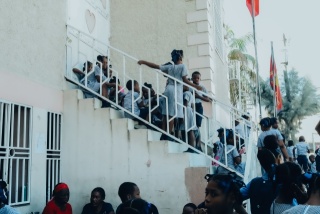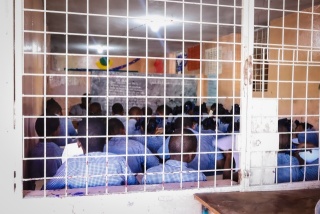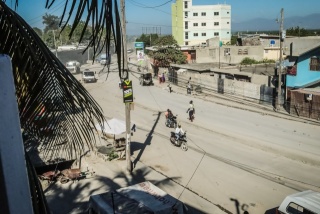
The Lost Generation of Haiti
Rob Padberg, founder of our partner, BND, talks about how Haitian children living in poverty and without access to education are recruited into armed gangs.
As gang violence continues to swell in Haiti, many young lives and their futures are in jeopardy as a result. Estimates show that the number of children being recruited into armed gangs has increased by 70% over the past year.
According to Rob Padberg, the founder of BND (Bureau de Nutrition et Developpement), one of Mary’s Meals’ trusted partners in the country, Haiti’s young people are the “lost generation”.

Recruiting Children into Armed Gangs
Rob has lived in Haiti for more than 40 years. Like many, he has witnessed first-hand the escalation of armed gang violence. Today, nearly all of the capital Port-au-Prince – as well as other parts of the country – have been overrun. Most at risk, he says, are children – both boys and girls – who are targeted to join the gangs.
“It is very difficult to keep the children away from gangs,” Rob explains. “There are about 200–250 gangs in Haiti. They are employing a lot of children because they need ‘soldiers’, as they call them, and it’s easier to recruit children.”
Recent figures suggest children now make up half of all armed group members. For many, it’s poverty, a lack of education, and the absence of essential services and security that pushes them to join.
Rob says many children are unable to go to school as their parents cannot afford the associated costs (e.g., uniform, books, lunch), so they hang around the streets – hungry and with nothing to do – and attract the attention of the gangs.
“They try to get the children who have nothing to do, who have no income, and they pay them to be their soldiers,” he says. “If you create a situation like that, it’s very difficult to get those children out. They are ending up in situations where it is very difficult to create a better life for themselves as adults. It is the lost generation.”

Children in Haiti Need Aid
Haiti has a long and troubled history. Political turmoil and poverty have contributed to the gang rule that is now crippling the country. The capital’s airport and some of its ports are closed, and schools, hospitals and media outlets have been burnt down. Many families have fled from Port-au-Prince.
Children count for more than half of Haiti’s internally displaced people in urgent need of humanitarian assistance and the number of internally displaced children has almost doubled – to more than half a million – since September 2024.
“There is nothing close to democracy now. Insecurity has increased,” he continues. “For many years, Haiti was the pearl of the Caribbean, but it has been going down and down. It is a very bad situation and unfortunately, I don’t see a short-term improvement.”

Serving Vital School Meals in Haiti
Remarkably, amid the deadly violence and upheaval, the vast majority of schools where children receive Mary’s Meals remain open and, thanks to the tireless efforts of our three local partners and thousands of volunteers, we are continuing to serve vital school meals to more than 175,000 children every school day.
Rob concludes: “The whole basis of Mary’s Meals and BND is to take care of and help your neighbor. We have the same goal – to help children to develop and grow into a new generation that can help the future of Haiti. We don’t only believe in giving children food but also helping them to develop.”
“Development means going to school, staying in school, and finishing school. From that, you build up a new generation. As humans, we are supposed to help each other.”
Mary’s Meals is focused on empowering communities to deliver effective school-feeding programs in areas where children are in most need of support. Working with expert partners enables us to reach children more effectively, or in contexts that would otherwise be difficult or even impossible to reach.
It costs just $25.20 to provide a child with school meals for an entire school year. Our work in Haiti is delivered through three local partners – BND, Summits Education and Caritas Hinche. Learn how the promise of a daily meal at school enables the children we serve in Haiti to receive an education and avoid getting caught up in gang violence.
